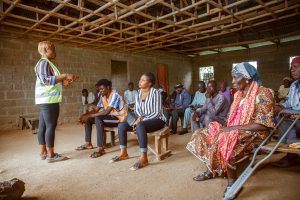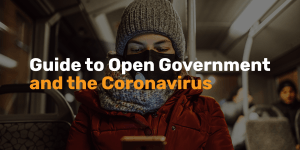
Broken Links
How can open data help shine a light on political corruption and make political systems fairer and more inclusive? How can we further link people and data to create a chain of accountability? Explore our new report.
![]()
Giving the public opportunities to provide input into government decision-making leads to more effective governance, improved public service delivery, and more equitable outcomes. In the context of open government, these deliberations allow the public to provide feedback on the actions of governments through organized discussions. Deliberative democratic processes have seen considerable innovation in the past few decades, ranging in formality, size, and permanence.
With OGP’s 2023-2028 Strategy, OGP members are set to work toward a number of aspirational thematic reforms through the Open Gov Challenge. This section of the Open Gov Guide addresses Public Participation.
Challenge prompt: Mainstream or embed fit-for-purpose, high quality and inclusive public participation practices across key government sectors, processes, and institutions.
Actions and reforms that fit within the scope of this challenge area are:
Definitions for key terms such as civic participation and deliberative democracy.
A growing body of evidence suggests that deliberative approaches can enhance decisions in a democracy.
The recommendations below represent reforms that national and local governments, representatives of civil society organizations, and others can consider for their action plans and the Open Gov Challenge. The reforms are categorized according to OGP’s principal values: transparency, civic participation, and public accountability. Reforms should be adapted to fit the domestic context, and involve and coordinate with other levels and branches of government.
Reforms across policy areas are also tagged by the estimated degree of difficulty in implementation. Though progress is often not linear, the recommendations have been categorized using these labels to give the reader a sense of how different reforms can work together to raise the ambition of open government approaches.
Transparency: Transparency empowers citizens to exercise their rights, hold the government accountable, and participate in decision-making processes. Examples of relevant activities include the proactive or reactive publication of government-held information, legal or institutional frameworks to strengthen the right to access information, and disclosing information using open data standards.
Civic Participation: When people are engaged, governments and public institutions are more responsive, innovative, and effective. Examples of relevant initiatives include new or improved processes and mechanisms for the public to contribute to decisions, participatory mechanisms to involve underrepresented groups in policy making, and a legal environment that guarantees civil and political rights.
Public Accountability: Public accountability occurs when public institutions must justify their actions, act upon requirements and criticisms, and take responsibility for failure to perform according to laws or commitments. Importantly, public accountability means that members of the public can also access and trigger accountability mechanisms. Examples of relevant activities include citizen audits of performance, new or improved mechanisms or institutions that respond to citizen-initiated appeals processes, and improved access to justice.
Inclusion: Inclusion is fundamental to achieving more equitable, representative, and accountable policies that truly serve all people. This includes increasing the voice, agency, and influence of historically discriminated or underrepresented groups. Depending on the context, traditionally underrepresented groups may experience discrimination based on gender, sexual identity, race, ethnicity, age, geography, differing ability, legal, or socioeconomic status.
Foundational: This tag is used for reforms that are the essential building blocks of a policy area. “Foundational” does not mean low ambition or low impact. These recommendations often establish basic legal frameworks and institutional structures.
Intermediate: This tag is used for reforms that are complex and often involve coordination and outreach between branches, institutions, and levels of government, with the public or between countries.
Advanced: This tag is used for reforms that close important loopholes to make existing work more effective and impactful. Specifically, “Advanced” reforms are particularly ambitious, innovative or close important loopholes to make existing work more effective, impactful or sustainable. They are often applied in mature environments where they seek to institutionalize a good practice that has already shown results.
Executive: The executive branch of government is responsible for designing, implementing, and enforcing laws, policies, and initiatives. It is typically led by the head of state or government, such as a president or prime minister, along with their appointed cabinet members. The executive branch’s functions also include overseeing the day-to-day operations of the government, managing foreign affairs, and directing the country’s armed forces. In democratic systems, the executive branch is accountable to the legislature and the electorate, with its powers and limitations outlined in the constitution or legal framework of the respective country.
Legislative: The legislative branch of government is responsible for making laws and regulations and overseeing the functioning of the government. It typically consists of a body of elected representatives, such as a parliament, congress, or assembly, which is tasked with proposing, debating, amending, and ultimately passing legislation. The legislative branch plays a crucial role in representing the interests of the people, as its members are elected to office by the public. In addition to law-making, this branch often holds the power to levy taxes, allocate funds, and conduct certain investigations into matters of public concern. The structure and powers of the legislative branch are usually outlined in a country’s constitution or legal framework, and it serves as a check on the executive and judicial branches to ensure a system of checks and balances within a state.
The following examples are commitments previously made within or beyond OGP that demonstrate elements of the recommendations made above. Commitments in this area have become increasingly popular, with almost all OGP members undertaking some kind of reform to improve or expand public dialogue.
Local governments have spearheaded participatory decision-making in many countries. They are often leaders in deliberative approaches, as they are closer to the people they serve, which allows for more direct participation in government. Local officials also may be the most well-positioned to understand the particular needs and concerns of their constituents.
Critically, local governments serve as laboratories for experimentation and innovation in governance. They have led new approaches, policies, and programs, such as:
For more examples of how cities are mainstreaming participation, the Bloomberg Harvard City Leader Initiative published a guide and workbook on this topic as part of its City Leader Guides series.
This list reflects members with commitments in the “Mainstreaming Participation” policy area of the Data Dashboard.
The following organizations have recently worked on this issue in the context of OGP at the national or international level. They may have additional insights on the topic. Please note that this list is not exhaustive. If you are interested in national-level initiatives, please contact [email protected].
The OGP 2023-2028 Strategy sets out the Open Gov Challenge and aims to provide clear benchmarks for performance through reliable data. At the current time, it is unclear if there is third-party data to match this challenge across OGP membership.
While the list below is not exhaustive, it aims to provide a range of recommendations, standards, and analysis to guide reform in this policy area.

How can open data help shine a light on political corruption and make political systems fairer and more inclusive? How can we further link people and data to create a chain of accountability? Explore our new report.

The promise of democracy is often defined by the ballot box, where citizens determine who will represent their interests in government. That promise, however, too often fails to translate to the reality of people’s daily lives...

Evidence continues to show that open government affects people’s lives. But there are still skeptics who are not aware of all the benefits associated with this approach. Use this guide to convince them to take an open government approach when implementing reforms.

The OGP Justice Policy Series is a three-part series on Access to Justice, Open Justice, and Accountability for Democratic Renewal. It aims to highlight the important synergies between justice and open government and the ways in which countries can use OGP to make accountable, credible improvements to their justice systems.
Access data on OGP commitments. Filter commitments by location, policy area, and year. Search by keyword.

This guide is a one-stop shop for the best current resources on how open government projects and approaches can support tackling the pandemic.
Nos encontramos en un momento de gran incertidumbre para los gobiernos, la sociedad civil y la ciudadanía. En el contexto del reto sin precedentes que representa la pandemia de coronavirus, los gobiernos están probando políticas y metodologías en tiempo real...
En ce moment, l'incertitude est à son maximum pour les gouvernements, la société civile et les citoyens. Face au défi unique que représente le Coronavirus, de nouvelles politiques et approches sont testées en temps réel...
Click here for more information about the Open Government Partnership's terms of use.
Terms & Conditions Close